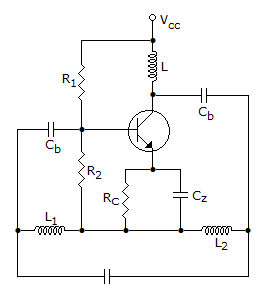Question

a.
Colpitt's oscillator
b.
Hartley oscillator
c.
Tuned emitter oscillator
d.
Clapp oscillator
Posted under Electronics and Communication Engineering
Interact with the Community - Share Your Thoughts
Uncertain About the Answer? Seek Clarification Here.
Understand the Explanation? Include it Here.
Q. The oscillator shown in figure is a
Similar Questions
Explore Relevant Multiple Choice Questions (MCQs)
Q. Figure represents a
View solution
Q. The circuit in figure is
View solution
Q. In order to obtain triangular pulses at the output of the circuit in the figure, the input should be.
View solution
Q. The circuit in figure is
View solution
Q. The oscillator shown in figure is a
View solution
Q. For an I/p of Vs = 5 sin ωt (assuming ideal diode), circuit shown in the figure will behave as a
View solution
Q. In figure
View solution
Q. In a Hartley oscillator the condition for sustained oscillations is hfe = L₁/L₂ . If there exists mutual inductance M between coils L₁ and L₂, then the above condition will get modified as hfe
View solution
Q. Figure shows current pulses of a class C power amplifier. The fundamental frequency of these pulses is
View solution
Q. The Clapp oscillator shown in figure will operate at
View solution
Q. Figure shows a zener circuit and characteristic of the zener used. If R2 is the lowest load resistance, then for proper voltage regulation R1 must be
View solution
Q. In figure, VC is approximately equal to
View solution
Q. Figure shows small signal model of CB amplifier circuit. Then I and R are respectively equal to
View solution
Q. Figure represents a
View solution
Q. In figure VBE = 0.7 V. If base current required to saturate the transistor is 0.1 mA, Vi =
View solution
Q. As per miller theorem the circuit of figure (1) can be replaced by that in figure (2) If V1/V2 = K, then Y1 and Y2 are equal to
View solution
Q. In a biased JFET (Figure) the shape of the channel is as shown because
View solution
Q. In a half wave rectifier, Vrms is
View solution
Q. The approximate value of input impedance of a common emitter amplifier with emitter resistance Re is given by
View solution
Q. The collector voltage VC of the circuit shown in the given figure aside is approximately
View solution
Recommended Subjects
Are you eager to expand your knowledge beyond Electronics and Communication Engineering? We've handpicked a range of related categories that you might find intriguing.
Click on the categories below to discover a wealth of MCQs and enrich your understanding of various subjects. Happy exploring!








